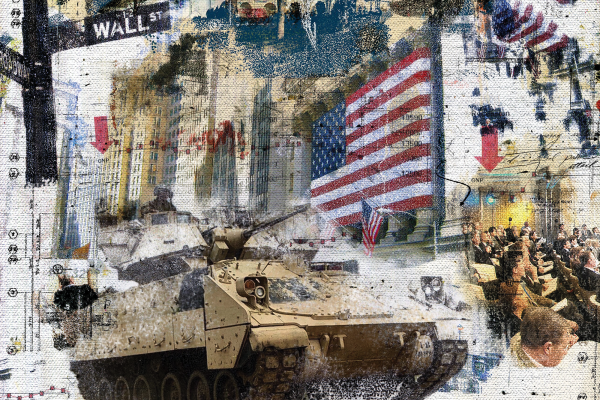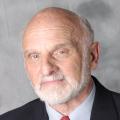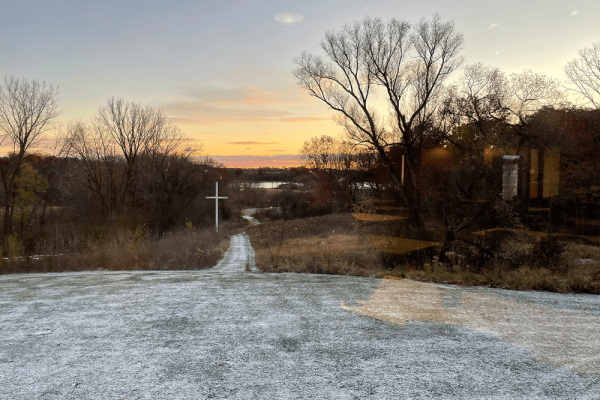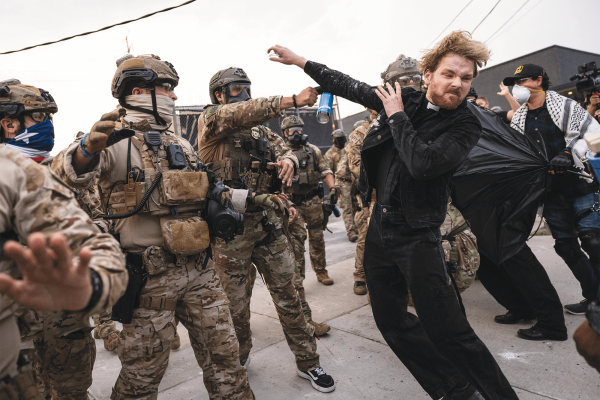THE PROPHETS CAN only be understood if you understand that their context is an ideological “totalism” that intends to contain all thinkable, imaginable, doable social possibilities. That totalism always wants to monopolize imagination and technology so that there seem to be no serious alternatives.
In the ancient world of the Bible, that totalism is represented and embodied by the monarchy of Solomon in the Jerusalem temple. The king was surrounded by priests in the temple and by scribes who did the fine print to legitimate everything. And that totalism was completely intolerant of any alternative thinking.
We are able, in the Old Testament, to identify many of the features of Solomon’s totalism. First of all, it was an economy of extraction that regularly transferred wealth from subsistence farmers to the elite in Jerusalem, who lived off the surplus, and the device and strategy for that extraction was an exploitative tax system.
That totalism also needs a strong military. Solomon was an arms dealer. Partly, Solomon’s military was for show, and partly it was for intimidation. The totalism also had to exercise enormous economic opulence to impress people with wealth, so that Solomon’s temple is essentially an exhibit of Solomon’s much, much gold. The temple, and the priests who operated the temple, fashioned a series of purity laws to determine who the purer people and the impurer people were, to determine who had access and who was excluded from the goodies.
The three-chambered temple of King Solomon is a lot like a commercial airline. There was the outer court for women and gentiles. There was the inner court for guys in suits. And there was the holy of holies where only the high priests could go. And that’s a lot like the tourist cabin and the first-class cabin and the cockpit where only the high priests can go. Everything is delineated by rank, and therefore by opportunities that come with it. And this whole enterprise of extraction and exhibit and grandiose commoditization was all blessed by a very anemic God, whose only function was to bless the regime. So that under Solomon, you get a chosen king, a chosen city, and a chosen land, to the exclusion of all those who were not chosen.
What you can see in the biblical record is that this totalism was completely impatient with and intolerant of any alternative thinking. It was prepared to crush any alternative thinking, which was represented by the prophets.
What you get is the expulsion of the prophets, or the killing of the prophets, because they challenge the totalism that was legitimated by this anemic God.
Eruptions of Poetry
IN THE WAY the history of the Old Testament works, for 400 years you get a recital of the kings of the family of Solomon, and these are the point persons for the extraction system. But when you read along in First and Second Kings, what you see periodically are eruptions of poetry. These are the prophets who come from nowhere. They regularly unsettle the kings, and they come to occupy space in the historical recital. You can see first of all that those prophets are without a pedigree. They don’t have any credentials that legitimate what they want to say. Second, they come from nowhere. They are people who do not accept the truth of the totalism, and the way they articulate their coming from elsewhere is that they either say, “Thus says the Lord,” or they say “The word of the Lord came to me,” and “the Lord” becomes a kind of a signal that this is a word that will not fit or accommodate the totalism.
The prophets, moreover, were deeply grounded in the old covenantal traditions and the wisdom traditions, so they knew that there were structures and limits inherent to the way of creation that could not be violated with impunity. They have a very vigorous notion of the governance of God. But along with that sense of tradition, they have an acute sense of social reality.
They know how to follow the money. They know that if you follow the money, what you can see is that the extraction system produces many grievances and cries of oppression and exploitation. And they have a peculiar affinity to the cries of injustice that they believe are the motor of creating futures. When you add all that up—no credentials, coming from elsewhere, knowing the tradition, doing social analysis—it is not surprising that the characteristic idiom of the prophets is that they speak in poetic rhetoric. They speak in language that on the one hand is porous and elusive and slippery, and on the other hand can be dangerous and offensive and scandalous to people who live inside the regime.
What you have in the Old Testament, when you read the royal history, are managers of extraction who tend to operate with an ambiguous memo. And disrupting that are these poetic voices that are dangerous and subversive, because they are voices that come from outside the totalism and refuse to accept the totalization as normative.
A Lively Character and a Real Agent
IF YOU TAKE the phrase “prophetic imagination,” the imagination part is that the prophets are able to imagine the world other than the way that is in front of them. The word prophetic alludes to the reality of God. What the prophets believe deeply is that God is a lively character and a real agent who acts in the world, who causes endings and who causes new beginnings. And that’s worth thinking about, because that is not ordinary thinking among us—that God is a lively agent and a real character.
If you consider most conservative evangelicals, they do not believe that God is a lively character and a real agent, because they’ve got God all packaged up into sustained systematic explanations. And if you consider most theological progressives, they don’t believe that God is a real character and a lively agent, either, because they really believe that God has no hands but our hands.
So prophetic imagination is grounded in the conviction that God is doing something lively in the world. That it may be slow, but it is very sure, and that a new world is coming into being that will discredit and dismiss the old totalism.
We can identify three prophetic tasks:
1) The first prophetic task is to be clear on the force and illegitimacy of the totalism. And what we have to recognize is that almost all of us—conservative and liberals, clergy and laity—are to some extent inured to the totalism. We take it as normative. And to take that as normative is a great narcotic that makes us passive and apathetic. Becoming clear and unambiguous about the force of the totalism is a teaching point that we really have to work at.
2) The second task of prophetic imagination is that we have to pronounce the truth about the force of the totalism that contradicts the purpose of God. That’s called prophetic judgment. And my sense is that in the institutional church we are very quiet about prophetic judgment, because we and most of our parishioners are too deeply committed to totalism.
But if we understand the totalism honestly and clearly, then we have to talk about that contradiction. And we are able to say that a predatory system of economic extraction contradicts the purpose of God, that the extraction system in which we live is fueled by cheap labor. And as we all know, the history of cheap labor in the United States is grounded in the institution of slavery. So, many of our economic arrangements are simply tradeoffs to continue the practices of slavery.
The things that go with cheap labor and slavery include regressive taxation, high interest rates, stacked mortgage rates, and debt—you can imagine the way we are helping college students get into insufferable debt, which assures that they will be willing workers in the extraction system for all of their working life. Plus, we have to recognize that this system is committed to the deregulation of banks, and all sorts of deregulation that lets creation be exploited. Deregulation really means the unleashing of predatory forces against the vulnerable.
We have to recognize that the totalism in which we live is a system of incredible militarization, such as the militarization of the police and the militarization of sports. And it’s clear that the totalism is committed to consumerism. It believes that more stuff will somehow make us safe and will somehow make us happy. This combination of acquisitiveness, militarization, and consumerism adds up to a doctrine of exceptionalism, which then gets translated into “Make America Great Again.” And it is all blessed by an anemic God who has no function except to bless white nationalism.
What prophetic judgment amounts to is making the case that acquisitiveness leads to violence, that militarization leads to bankruptcy, that consumerism leads to the evaporation of citizenship, that ecological exploitation leads to chaotic weather, that silencing leads to brutality, and that exceptionalism leads to white tribalism. It is a package that needs to be exposed at the teaching level of the religious community.
The first task is to identify the totalism. The second task is to identify the contradictions that put us on the route to death, because one can see that we now live in a society that is engaged in its self-destruction.
3) And the third task of prophetic imagination is to articulate the alternative world that God has promised and that God is birthing before our very eyes. If we have eyes to see it.
It is not often enough noticed that for all of the harsh judgment of Amos and Isaiah and Jeremiah, there runs through their rhetoric extraordinary promises about beating swords into plowshares and not learning war anymore. All of which have come to contemporary fruition in Martin Luther King Jr.’s “I Have A Dream.” It is a dream that imagines a world that is completely alternative to the one in which we now live.
Imagining the Future
HERE ARE FOUR dimensions of the future that prophetic imagination ought to be imagining:
1) The first is a new ecological perspective in which the earth and all of the creatures of the earth are treated like covenant partners who are entitled to dignity and viability. Every acre, every squirrel, every radish, every whale, every cornstalk is entitled to viability and respect. The new environmentalism is an alternative to the world of plastic accumulation that is killing our oceans and our ocean creatures.
2) The second facet of prophetic promise is a new ecumenism that makes room for chosen peoples other than Western white Christians.
That does not mean we Christians give up our claims about Jesus. And we are in the process of recovering Jesus. But it means we recognize that our claims about Jesus are not universal statements; they are confessional statements about how we intend to live our life. And that means that we have to make room for other religious traditions, respect the viability of their claims, and find allies where we can who are about the main prophetic tasks of justice and holiness.
3) The third facet is a new economy organized around a love of neighbor and committed to the viability of widows, orphans, and immigrants. Widows, orphans, and immigrants are people who, in the ancient world, did not have advocates empowered by the totalism in a patriarchal society. Obviously, the 1 percent intends to keep extracting from the vulnerable until we have only the 1 percent and a big collection of subsistence peasants who have no economic viability. We have to educate the church that we are not really in the charity business, we are in the justice business.
4) And fourth, the prophetic imagination means a new multiculturalism that opposes, in all the vigorous ways we can think of, white nationalism and all that’s now about making white America Great Again. The Bible, because of its permeation with chosenness, lends itself too easily to that reading of tribal chosenness. But there are all kinds of trigger hints in the Old Testament and in the New Testament to the contrary—that chosenness has to remain open, that God is in the business of choosing many other peoples. Look at Peter’s incredible vision in Acts 10, where God tells him to eat impure food to violate the old purity codes of Leviticus, and out of that comes this incredible dawning on Peter and Paul and all of the apostles that the good news of God’s transformative love in the world is not a monopoly of any race or tribe or nation or tongue.
No More Middle Ground
THE PRACTICE OF prophetic imagination requires energy, courage, and freedom and the sense of being otherwise. I have no doubt that we are now arriving at a moment when there is no more middle ground. That we either sign on uncritically to the totalism, or we take on this task of dangerous oddness that exposes the contradictions and performs the alternatives.
Finally, I want to make a comment about the institutional church. The institutional church is a very weak instrument for the poetic imagination. But it is the best instrument we have—because when people come to church, they expect us to talk funny. They expect us to talk about God. We are now at a point when the church has got to recover its nerve, its energy, its courage, and its freedom.
To be about our proper business, the church cannot engage in prophetic imagination as long as it lives in the cocoon of the totalism. And that, of course, is where many clergy and the laity want the church to stay. Because you get rewards for that—you get money, payoffs, success. But our mandate and our vocation is otherwise.
I think the church now must be more vigorously engaged in scripture, after having been lazy for a very long time. And the church must do a much better job of social analysis than we have done, because very many church people think that social analysis feels like communism—and clearly the prophets were doing social analysis before anybody ever heard of Karl Marx.
The good news, that you can see all around now, is that the Spirit is moving among us. It is the Spirit of Jesus. And Jesus is that great voice of otherwise, who saw the contradictions of the gospel to the Roman Empire and who acted out an alternative.
Good Friday, which keeps being re-performed, was the last desperate reach of the totalism of the Roman Empire. They did their best. Jesus was executed as an enemy of the totalism. And Easter is that strange, wondrous gift of newness that rushes beyond the totalism.
It is no wonder that Mark ends his gospel by saying that they were afraid. It is very fearful to discover that the totalism is not normal. But it is the truth of the matter.
This article is adapted from a speech delivered via video to participants of The Summit 2018, a project of Sojourners.

Got something to say about what you're reading? We value your feedback!






